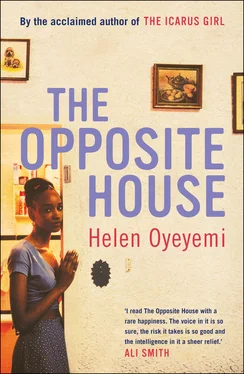Helen Oyeyemi - The Opposite House
Здесь есть возможность читать онлайн «Helen Oyeyemi - The Opposite House» весь текст электронной книги совершенно бесплатно (целиком полную версию без сокращений). В некоторых случаях можно слушать аудио, скачать через торрент в формате fb2 и присутствует краткое содержание. Год выпуска: 2008, Издательство: Bloomsbury UK, Жанр: Современная проза, на английском языке. Описание произведения, (предисловие) а так же отзывы посетителей доступны на портале библиотеки ЛибКат.
- Название:The Opposite House
- Автор:
- Издательство:Bloomsbury UK
- Жанр:
- Год:2008
- ISBN:нет данных
- Рейтинг книги:4 / 5. Голосов: 1
-
Избранное:Добавить в избранное
- Отзывы:
-
Ваша оценка:
- 80
- 1
- 2
- 3
- 4
- 5
The Opposite House: краткое содержание, описание и аннотация
Предлагаем к чтению аннотацию, описание, краткое содержание или предисловие (зависит от того, что написал сам автор книги «The Opposite House»). Если вы не нашли необходимую информацию о книге — напишите в комментариях, мы постараемся отыскать её.
The Opposite House — читать онлайн бесплатно полную книгу (весь текст) целиком
Ниже представлен текст книги, разбитый по страницам. Система сохранения места последней прочитанной страницы, позволяет с удобством читать онлайн бесплатно книгу «The Opposite House», без необходимости каждый раз заново искать на чём Вы остановились. Поставьте закладку, и сможете в любой момент перейти на страницу, на которой закончили чтение.
Интервал:
Закладка:
I try to back away but he is busy positioning me, straightening and extending my arm so that it matches his, wrapping his other arm around my waist to try and make me sway. I know that I cannot do this dance — there is something inside me that is slow, something that rises slowly, dips slowly. Something that does not talk back to a drumbeat.
‘I don’t want to,’ I say, too quiet. He steps to show me how to step, and I am dragged along with him. I see myself in the mirrors; I am wide-eyed and tight lipped, and where Teofilo is not holding me straight, I flop like a dummy.
‘Please! I don’t want to!’ I say, and I am louder than the music. Teofilo lets me go, shrugs at Magalys and turns away to switch off the cassette player. To Teofilo’s back, and to Magalys, I say, ‘I just don’t really feel this kind of music.’
Magalys tucks her arm through mine, pats my shoulder reassuringly and tells me, ‘No te preocupes, no es nada, no es nada . But you should know that, though it is not quite your jazz singing, it is really not all that different.’
We walk to the coffee shop across the street without saying anything else to each other, listening to the conversations around us and the traffic humming nearby and looking at each other without embarrassment, as if we are content to let the traffic be our speech.
We find a corner table and settle, carefully rolling our mugs of coffee over our palms to counteract the cold. We chorus, ‘So how are you?’ Magalys answers first.
‘I am doing well,’ she tells me. ‘Teofilo has a lot of students, so we share them and it means he gets to have longer breaks.’
‘Is that why you’re here?’ I ask her.
Magalys looks at me blankly, waits for me to elaborate.
‘Did you want to come here to teach dance?’
Magalys shakes her head, her curls bounce. ‘Oh, no. I just came over here to see what it is like. To see if I miss Cuba. I certainly don’t miss la lucha . I certainly don’t miss having to be clever every day and having to smile at ugly men who have ranking and can allocate me more meat than I’ve been allocated, or more fish than I’ve been allocated, or a new kettle.’
She sips her mocha, blows on it, sips again, says, ‘But,’ at the same time as I say it for her, as a question. She looks around the coffee shop, at the casement-framed paintings and the people chattering on the purple sofas, as if the whole shop will fall down on her if she is not grateful to be here.
‘I don’t know, sometimes it just doesn’t really feel like anywhere over here. I look at maps and stuff and none of the places seem real. I think that’s what happens when you don’t belong to a country, though — lines are just lines, and letters are just letters and you can’t touch the meaning behind them the way you can when you’re home and you look at a map and you see, instead of a place name, a stretch of road or an orchard or an ice-cream parlour around the corner. You know. It’s OK, though. I didn’t expect to know this place. You haven’t told me how you are doing.’
I say, ‘I’m fine.’ There is an awkward silence because we both know that I don’t want to give her any more than that.
‘You really scared me at that Vedado party, you know,’ Magalys says, eventually.
My heart hammers in my chest and there is no room in there for me to be louder than my heart and tell her that I’m sorry about what happened to her. I drink my coffee, drink it down as if it’s going to save my life, and say nothing.
Magalys says, ‘I thought about you a lot when you went away. I used to worry without really knowing why. I felt as if I knew you well because I had seen you fall ill.’
‘Fall ill?’ I examine Magalys’s face; she is frowning.
‘Don’t you remember?’ she says. ‘We were under the table, and —’
‘A woman came and started to sing,’ I interject, but Magalys only skips a beat before waving my words away: ‘You don’t remember? We were under the table, playing dominoes, and all the grown-ups were at the table eating and drinking and some of them were asking where we were, and we started laughing, but then you said “shush”, and put a finger to your lips. You started shaking, and I knew it wasn’t normal shaking, I straightaway knew. Your eyes were rolling so much, and you were biting your tongue, and you were. . I don’t know — but you were staring at me and I felt as if you’d closed the world or something. I yelled so loud that everyone looked under the table at almost exactly the same time. And your Mami took you away. You don’t remember?’
I need to think — I try to smile and think at the same time. I close my eyes and try to fetch back that lantern-lit night, the singing, and the other girl, rosy Magalys, flailing the air. But now there are gaps ripped through the image and the singing has turned to a mashed, static whine. I want to ask Magalys what she has done to my one whole memory. Instead I say, still smiling, ‘That’s not how it happened, Magalys.’
(Magalys please see my smile see it is not a happy one and agree with me just shut up and agree with me)
Magalys stares at me. ‘I remember your mother just picked you up and took you away, and almost as soon as she’d gone, some people started whispering about her and you and saying that she’d asked a babalawo to give you visions, to see how it would go with you abroad. The fit seemed like a bad sign.’
I am not the one who had the fit — how could it have been me? Or, if I had the fit, then I had already left that place and it was you who were caught fast in illness like glue, while elsewhere the woman sang.
I need my Cuba memory back, or something just as small, just as rich, to replace it; more food for my son, for me. I think I will pretend that I am not from Cuba and neither is my son. The boy and I started a race from that other country, and I got here first.
I walk up the street from Aaron’s flat to the travel agent’s, and I take time during the journey to stand still and gape at nothing; I don’t care who sees — I do it because I need to. If I don’t protest my skin will destroy me. When I rubbed cream into my skin today, the cream layered, then scratched away to show me that I am a gourd, bound in crisp servility to my insides.
With plane tickets in my bag I call Chabella, maybe to tell her about a thing that I will soon be unable to hide. When she picks up the phone, I say that I have called by accident.
On a dais in a London church, the Virgin Mary sits surprised by a rough crest of candlelight. The discomfiture isn’t in her expression, but in the fluid form her carving takes, the way peaceful eyes rest in sockets that threaten to release them. Either the wood is eccentrically soft, or this sculpture remains a tree, alert
(despite careful varnishing and a wide, warning ring of sacred space around it)
to a propensity to burn. The rest of the church is dim and all of a piece; russet floors nascent with insubstantial pews, Stations of the Cross boarded to the tops of the very last row. Incense knots in Aya’s nostrils. Her hands shake as she leans over and puts a candle to the Virgin’s rigid blue shawl, willing her to catch fire. Varnish turns to smoke.
But Tayo speaks a greeting into Aya’s ear, slips his arm around her waist and reaches up, gesture joined to hers, to capture the candle’s metal base from her hand. He blows the flame out. She side-steps him and he follows, plucking her away from the bank of candles when she backs too close to them. His hair is done all over bumps, plaits dragged in on themselves.
‘What are you doing here?’ they ask each other. Outside it is calm. The sun’s gift to the day is the most benevolent yellow Aya has ever seen. Today is bright yellow like waking well after a long illness; the heart’s tinny hymn post-crisis. Gold.
Читать дальшеИнтервал:
Закладка:
Похожие книги на «The Opposite House»
Представляем Вашему вниманию похожие книги на «The Opposite House» списком для выбора. Мы отобрали схожую по названию и смыслу литературу в надежде предоставить читателям больше вариантов отыскать новые, интересные, ещё непрочитанные произведения.
Обсуждение, отзывы о книге «The Opposite House» и просто собственные мнения читателей. Оставьте ваши комментарии, напишите, что Вы думаете о произведении, его смысле или главных героях. Укажите что конкретно понравилось, а что нет, и почему Вы так считаете.












